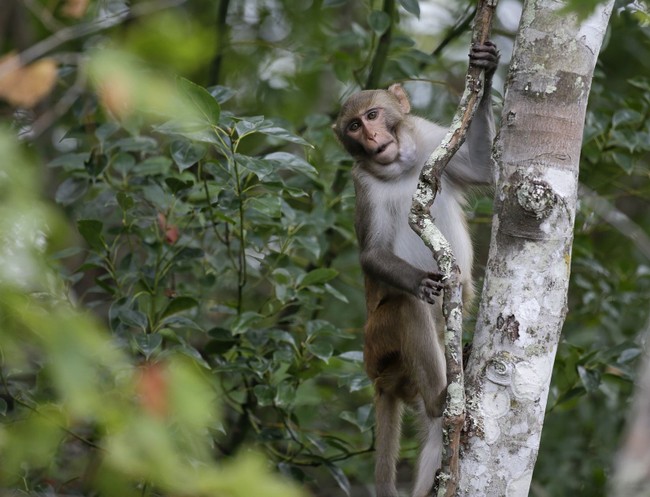
There’s a tourist site on the southern tip of Bali called Uluwatu Temple which attracts visitors with its panoramic views of the ocean and its shows featuring a traditional fire dance. But the temple is also home to a large group of long-tailed macaques who’ve come up with a unique way of exploiting their environment, a niche if you will. They steal from the tourists and trade the stolen goods for food.
“The monkeys have taken over the temple,” said Jonathan Hammé, a tourist from London whose sunglasses were stolen by a monkey during a visit last year. “They’re running a scam.”…
Primate researchers have found that the macaques steal belongings to use as currency to trade with humans for food. Some monkeys can distinguish between objects we highly value (smartphones, prescription glasses, wallets) and those we don’t (hats, flip flops, hair clips)—and will barter accordingly, according to a University of Lethbridge team that spent years filming the macaques and analyzing hundreds of hours of footage.
There are as many as 600 monkeys that live near the temple and an unknown number of them are involved in the tourist scam. The temple has a team of monkey handlers with decades of experience trying to get people’s valuables back.
Many cases require the help of the temple’s monkey handlers, called “pawang,” who negotiate with the furry hostage-takers. They offer fruits such as bananas, mangos, rambutan and mangosteen in exchange for the stolen items. In rare cases, they use raw chicken eggs, highly coveted by the monkeys.
Ketut Ariana, a 52-year-old who has been working for the temple as a monkey handler for two decades, said the animals steal dozens of items a week, including five to 10 smartphones a day.
No one is sure how this got started. In the past, the monkeys would steal jewelry from temple visitors, maybe just because the items were shiny. The food part of it may have come in accidentally. For a time, tourists would feed the monkeys and then the temple stopped that and started feeding the monkeys directly. That’s when the monkeys started stealing.
The WSJ story doesn’t say this but it sounds like the monkey equivalent of an entitlement. They monkeys got used to expecting food from the tourists and when the tourists stopped offering it, they took something else instead. And that behavior was reinforced as the monkeys quickly learned the handlers would give them food to drop the stolen goods. Many years later, nothing seems to dissuade the monkeys from stealing. It’s how they make their living and they also just seem to enjoy it.
…the temple has tried many methods to attempt to curb the stealing: different feeding schedules (from three to six times a day) and different food at the regular feedings (corn, sweet potato, mangos and other options). But the robbing behavior continues.
The monkeys are also known to steal just for fun.
A commenter notes that something similar happened to him in Mexico:
My prescription glasses were snatched off my face and as the monkey swooped away, I snatched my glasses back. My wife was stunned by my quick reflexes, as was the monkey and its handler. I subsequently learned that the scheme is the monkey steals, the handler gets your item back with a bribe of food, you tip the handler in gratitude. Is this “monkey business” or human business?
He has a point. The problem created by the monkeys is met with help from the handlers who are employed to deal with it. If the monkeys stopped stealing, the handlers jobs would go away too.
BBC Earth did a segment on the monkeys a year ago. This suggests you can tell the smarter monkeys who know the value of things. They’re the fat ones.












